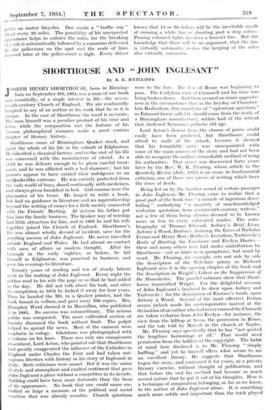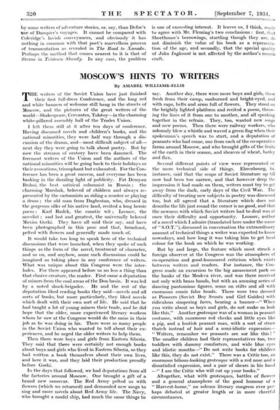SHORTHOUSE AND "JOHN INGLESANT "
By S. K. RATCLIFFE
j'OSEPH HENRY SHORTHOUSE, born in Birming- ham on September 9th, 1834, was a man of one book and, essentially, of a single interest in life—the seven- teenth-century Church of England. We are continually tempted to say of an author or his work that he or it is unique. In the case of Shorthouse the word is accurate. The man himself was a peculiar product of his time and town, while the composition and the fortune of his 'anions philosophical romance make a most curious 2hapter of literary history.
Shorthouse came of Birmingham Quaker stock, and spent the whole of his life in the suburb of Edgbaston. He inherited a chemical factory, and to the end of his life was concerned with the manufacture of vitriol. As a child he was delicate enough to be given careful treat- ment, and he was afflicted with a bad stammer ; but his parents appear to have carried their indulgence to an un-Quakerlike extreme. He was entirely protected from the rude world of boys, dosed continually with medicines, and always given breakfast in bed. Girl cousins were the playmates of his teens. He longed to write a book, but had no guidance in literature and no apprenticeship beyond the writing of essays for a little society connected with the Friends' Meeting. At sixteen his father put him into the family business. The Quaker way of worship had little attraction for him, and in 1861 he and his wife together joined the Church of England. Shorthouse's life was almost wholly devoid of incident, save for the startling success of John Inglesant. He never travelled outside England and Wales. He had almost no contact with men of affairs or modern thought. After his triumph in the early 'eighties, as before, he hid himself in Edgbaston, was punctual in business, and gave his evenings to literature.
Twenty years • of reading and ten of steady labour went to the making of John Inglesant. Every night the author read to his wife the page or so that he had added in the day. He did not talk about his task, and after its completion in 1876 he locked it away for four years. Then he handed the MS. to a Quaker printer, had the book bound in vellum, and gave away 100 copies. Mrs. Humphry Ward showed it to Macmillan, who published it in 1881. Its success was extraordinary. The serious Public was conquered. The more cultivated section of Society discussed the book without limit. The pulpit helped to spread the news. Most of the eminent were emphatic in eulogy. Gladstone was photographed with a volume on his knee. There was only one conspicuous dissentient, Lord Acton, who pointed out that Shorthouse had greatly exaggerated the influence of the Catholics in England under Charles the First and had taken out- rageous liberties with history in his story of Inglesant in Italy. Both criticisms were sound. But it was the union of style and atmosphere and exalted sentiment that gave John Inglesant a place without a competitor in its decade. Nothing could have been more fortunate than the hour of its appearance. No book that one could name em- bodied so large a measure of the political and social reaction that was already overdue. Church questions were to the fore. The fear of Rome was beginning to pass. The Carlylean view of Cromwell and his time was being broken down. And there seemed an ironic apposite- ness in the circumstance that in the heyday of Chamber- lain Radicalism, this manifesto of " epicurean quietism," as Edmund Gosse called it, should come from the study of a Birmingham manufacturer, within hail of the retreat that sheltered Newman's pathetic old age.
Lord Acton's dissent from the chorus of praise could • easily have been predicted, but Shorthouse could afford to smile at the attack, because it showed that his formidable critic was unacquainted with some of the main sources of the story and had not been able to recognize the author's remarkable method of using his authorities. That secret was discovered forty years later by the Rev. W. K. Fleming, whose article in the Quarterly Review (July, M5) is an essay in fundamental criticism, one of those rare pieces of writing which have the force of deeds.
Being led on by the familiar sound of certain passages in John Inglesant, Mr. Fleming came to realize that a good part of the book was "a miracle of ingenious dove- tailing," embodying "a quantity of unacknowledged verbatim quotation from seventeenth-century writers," not a few of them being classics deemed to be known more or less to every cultivated reader. The auto- biography of Thomas Ellwood, Aubrey's Brief Lives, Antony a Wood, Burton's Anatomy, the Lives of Nicholas Ferrar and Henry More, Hobbes's Leviathan, Turbervile's Hooke of Hunting, the Fanshawe and Evelyn Diaries — these and many others were laid under contribution by Shorthouse—not as hints or in paraphrase, but word by word. Mr. Fleming, for example, sets out side by side the description of the Wiltshire priory as Richard Inglesant sees it in the opening chapter of the book and the description in Wright's Letters on the Suppression of the Monasteries. The parallel columns show that Short- house transcribed Wright. For the delightful account of John Inglesant's boyhood he drew upon Aubrey and Turbervile ; for the description of Eustacc's tomb, upon Antony a. Wood. Several of the most effective Italian scenes (which made his contemporaries marvel at the divination of an author who had never crossed the Channel) are taken verbatim from John Evelyn—for instance, the view from the hilltop at Siena, the procession in Rome, and the tale told by Malyoli in the church at Naples.
Mr. Fleming says specifically that he has "not quoted the lengthier borrowings at all." That would need permission from the holders of the copyright. The habit of mind here disclosed is to Mr. Fleming "simply baffling," and yet he himself offers what seems to me an excellent theory. He suggests that Shorthouse began the story, and continued it for years, as a private literary exercise, without thought of publication, and that before the end his method had become so much second nature that he put it out of his thoughts. Here is a technique of composition belonging, so far as we know, to the author of John Inglesant alone. It is something much more subtle and important than the trick played by some writers of adventure stories, or, say, than Defoe's use of Dampier's voyages. It cannot be compared with Coleridge's lavish conveyances, and obviously it has nothing in common with that poet's marvellous process of transmutation as revealed in The Road to .Xantidu. Perhaps the method that comes- nearest to it is that of Sterne in Tristram Shandy. In any case, the problem is one of exceeding interest. It leaves us, I think, ready to agree with Mr. Fleming's two conclusions : first, that Shorthouse's borrowings, startling though they are, do not diminish the value of his book as a representa- tion of the age, and secondly, that the special quality of John Inglesant is not affected by the author's mosaic craft.







































 Previous page
Previous page